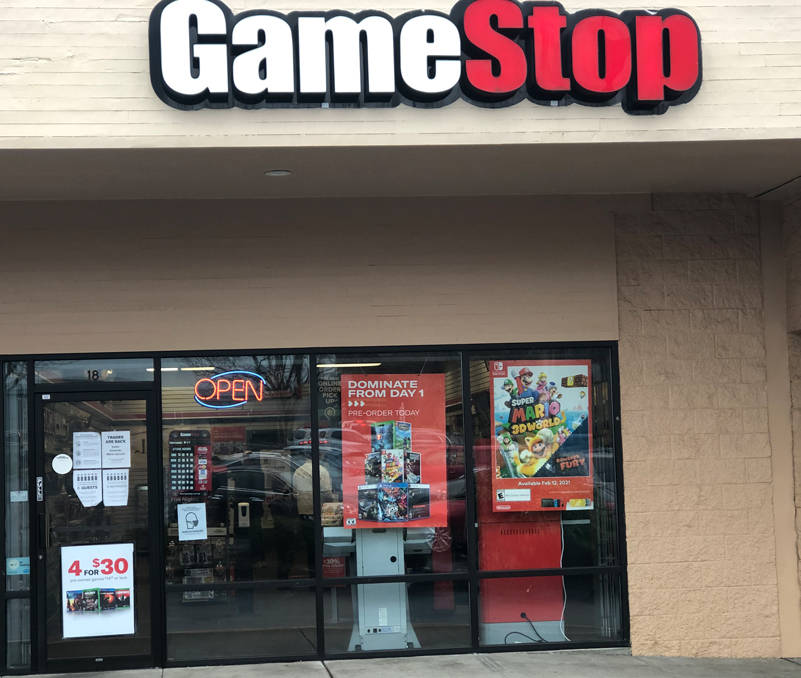Welcome to the casino
By Morf Morford
Tacoma Daily Index
If your bias is that the stock market is more casino than reliable economic indicator, with barely one foot (or finger) in the actual buy and sell marketplace, you had plenty of evidence in the (non-market based) evaluation swings of troubled, if not declining businesses (and stocks) like GameStop, Blackberry and AMC.
In the old days, (meaning some mythical time in the distant past) the stock value of a company had some relationship to its value. That value could be actual (as in currently existing) or it could be its future value, possible sales, new developments or upcoming contracts (hence the investment strategies of investing in “futures”).
You could even bet, I mean invest, in the decline of a company’s stock (where you put your money on a lower-than-market price) in the hope that you, as an investor, can profit from the difference. This is called “shorting.”
The fracture between Wall Street and Main Street has become wider and more impassible over time. But each one operated under its own internal logic.
Main Street brick and mortar stores live with multiple, largely straight-forward, rules and demands.
The cost of doing business might be a challenge and occasionally frustrating burden, but for the most part, those costs (for better or worse) are almost hard-wired into the business’s existence.
Accounts payable and receivable, cash-flow in and out, is the ultimate balancing game. Positive accounts, or profit margin, is the goal and making it (or missing it) will define the survival of the company.
The stock market, and those who “play” it, have very different rules and assumptions.
Shorts, for example, require a margin (investment funds not yet invested) to cover any potential losses.
This is where investors (and brokerage firms) can get pulled into huge financial whirlpools.
Robinhood (the firm that was the platform for the recent GameStop imbroglio) was on the hook for three billion dollars on behalf of its investors who were shorting. https://www.nytimes.com/live/2021/02/01/business/us-economy-coronavirus?
As we have seen from the GameStop upheaval, the stock value (at least temporarily) can have little or even no relationship to the market value (current or future) of the company.
If that is true, as it seems to be for a short while, what is it that investors are actually investing in?
The wildly fluctuating stock prices have literally nothing to do with sales, value, customers or even the continuing existence of the company.
The stock market originally was intended to be a way that investors could invest in an actual company. The company, in an IPO (Initial Public Offering) could raise money to expand its reach.
GameStop is on the opposite end of that schedule (who goes to a physical store to buy a video game when they can be downloaded and streamed?).
GameStop (like Blackberry, AMC and several others) are in a decline, if not death spiral.
There is no scenario where GameStop, as a brick-and-mortar chain, for example, can reverse its decline.
The fiscal value, in the case of GameStop, is irrelevant. The ending, for investors and the market, does not look good.
Some portray the scene as a financial David and Goliath story – with a critical mass of (amateur) investors outsmarting hedge fund investors at their own game.
The massive hedge fund investors do, just by the sheer volume of their investment dollars, tilt the market in their favor. Their funds fill the pension accounts of many of us as individuals and companies.
The Reddit-based investors are a more “populist” version of the professional hedge fund investors. A few hundred (or thousand) small accounts can tilt, sometimes dramatically, the cost of shares across the economy.
But they won’t change the ultimate fate of companies like GameStop, Blackberry or AMC. Or Radio Shack or dozens of others.
This approach to “investing” is, by any definition, abstract to the point of lunacy.
Yes, money may be made, but it won’t be because the business has gained a better footing – or even a new business strategy, but because the investing itself has become the purpose – https://www.bloomberg.com/news/articles/2021-01-30/-like-a-drug-redditors-stock-mania-fueled-by-gambling-high?
Like the violence in our urban centers, and the entrenched extremism of our political polarities, de-escalation is what we need in times of economic volatility.
When value is disconnected from actual markets, products and labor and money is sloshing around with no purpose, meaning or direction, our system is, if nothing else, in need of major re-evaluation – maybe even exclaiming a cry for help. https://www.commondreams.org/views/2021/01/30/gamestop-saga-reveals-society-dominated-wall-street-and-crying-out-change?
The idea of wealth without work, or even without value (actual or potential) is literally a belief in nothing.
The premise of slavery (or for cynics, the premise of capitalism) is that wealth can be based on the labor of others.
The darlings of our current economy don’t even believe that; they believe, and behave, as if money is a near-pure fictional abstraction. Game theory is more of working principle than any traditional economic theory.
The irony of course, and there are many, is that this is how the multi-billion-dollar hedge funds and venture capitalists have been doing business for decades.
Money is the beginning and end of these transactions – nothing is made or created, no skill is developed, no product or service is delivered. Nothing is accomplished.
It is an economic black hole where money, life-savings and our pension funds disappear forever.
Money sloshes around in these markets, and a lucky few, like lottery winners, are featured on our business pages.
This economic system is a logical corollary to Qanon, where actions are based on imaginary events (or even alien life-forms or alternate dimensions) and the adherents are somehow surprised when reality finally hits – or in the case of the GameStop scenario – the market comes crashing back down.
But until it does, want to buy some stock in Radio Shack or Blockbuster video?






